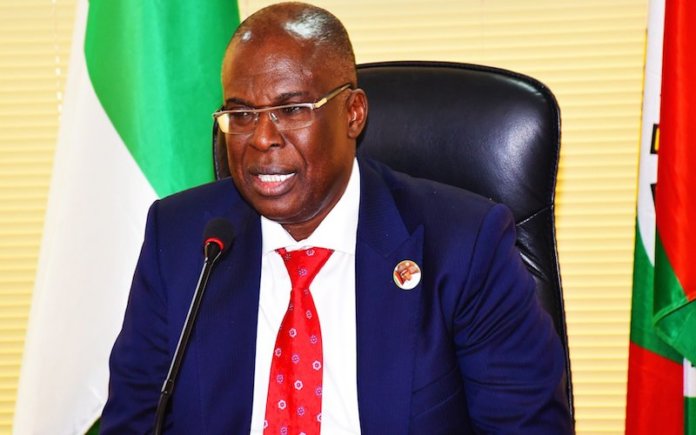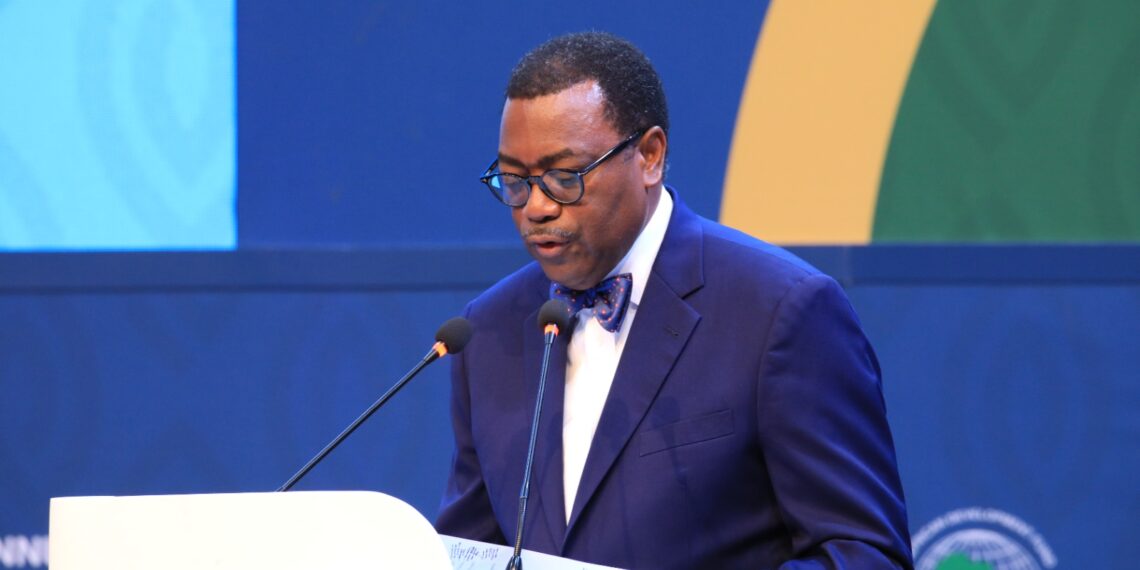
Boosting Ammonia, Fertiliser Production for Nigeria Farmers
- Agriculture
- No Comment
- 366

With the recent signing of a Memorandum of Understanding between Nigeria and the Moroccan government that will see Akwa Ibom State host a plant to boost both ammonia and fertiliser production in Nigeria, Chiemelie Ezeobi reports that for farmers, this is a huge plus as this would provide them with locally produced quality fertilisers at competitive prices
For any farmer, fertilisation is key to gainful harvest. This is because fertilisers replace the nutrients that crops remove from the soil and without the addition of fertilisers, crop yields and agricultural productivity would be significantly reduced.
Undoubtedly, this is why mineral fertilisers are used to supplement the soil’s nutrient stocks with minerals that can be quickly absorbed and used by crops. However, one of the challenges faced by farmers is getting such fertilisers at affordable prices. Which was why the recent Memorandum of Understanding (MoU) signed by the Federal Government of Nigeria and Moroccan government has been lauded by stakeholders.
Understandably, the plant, said to be worth $1.3 billion will utilise Nigeria’s gas and Morocco’s phosphate to produce 750,000 tons of ammonia and one million tons of phosphate fertilisers annually by 2025.
Fertiliser Policy
Over the years, agricultural policy in Nigeria has evolved since its adoption in 1998. According to Africafertiliser.com, this policy was targeted at ensuring food security for the population by developing local production. In 2001, the “New Agricultural Policy Thrust,” was borne and this was supported by a number of sub-sector policies, such as the National Fertiliser Policy for Nigeria and the National Policy on Integrated Rural Development, both of which are crucial for the attainment of national food security.
Essentially, the National Fertiliser Policy for Nigeria, which was finally adopted in 2006, was comprehensively set up to facilitate farmers’ timely access to adequate quantity and quality of fertilisers at competitive and affordable prices. Not only did the policy launch many principles, oy also outlined room for government intervention in fertiliser production, international trade, domestic marketing, research and development, quality control, environmental impacts, farm use and governance and institutions.
According to reports, this policy essentially provided broad guidance on government actions to develop the fertiliser sub-sector in harmony and in support of the planned agricultural development.
Challenges of the Policy
Despite its advantages, the policy also faced some challenges including how to make the implementation feasible at all levels, as well as put in place regulatory mechanisms and quality assurance.
Also, as identified in the policy document, some of the major challenges facing the fertiliser
sub-sector include how to increase and improve the use of fertilisers, achieve agricultural competitiveness through fertiliser usage, induce and sustain nutrient use efficiency, safeguard the environment with fertiliser production and use, exploit available raw materials for fertiliser
production and raise employment in the fertiliser industry.
Memorandum of Understanding
Over the years, the FG has sought ways to boost ammonia and fertiliser production for Nigeria farmers, as we as tackle the above mentioned challenges facing the fertiliser sub-sector.
After brainstorming, a partnership seemed the way out and recently to seal the deal, the Minister of state for Petroleum Resources, Timipre Sylva, led a federal government delegation to the signing of a Memorandum of Understanding (MoU) to host a plant to boost both ammonia and fertiliser production in Akwa Ibom, Nigeria.
Interestingly, the MOU, which was signed at the University Mohammed VI Polytechnic in Morocco by OCP Africa and Sylva for Nigeria, is a build up to the industrial platform launched in June 2018 following the first phase of the Presidential Fertiliser Initiative (PFI).
In details, the MOU which was signed to facilitate the take-off of the plant include a pact between OCP Africa, Fertiliser Producers and Suppliers Association of Nigeria (FEPSAN) and Nigeria Sovereign Investment Authority (NSIA) in order to commit to the second phase of PFI; a shareholders’ agreement between OCP Africa and NSIA for the creation of a joint venture company (JVC).
Essentially, this would oversee the development of a versatile industrial platform that will produce ammonia and fertilisers in Nigeria; a memorandum of understanding (MoU) between OCP Africa, Nigerian National Petroleum Corporation (NNPC) and NSIA to evaluate the opportunity of an equity investment by NNPC in the JVC and for its support on gas; a framework agreement between OCP Africa, Mobil Producing Nigeria (MPN), NNPC, Gas Aggregation Company Nigeria (GACN) and NSIA on gas supply for the industrial platform; an MoU between OCP Africa, Akwa Ibom State and NSIA on land acquisition, administrative facilitation and common agricultural development projects.
For farmers, this is a huge plus as this would provide them with locally produced quality fertilisers at competitive prices. Understandably, the plant, said to be worth $1.3 billion will utilise Nigeria’s gas and Morocco’s phosphate to produce 750,000 tons of ammonia and one million tons of phosphate fertilisers annually by 2025.
Foundation
But how did the journey to the MoU start? It all began on December 3, 2016, during King Mohammed VI of Morocco’s state visit to Abuja the see President Muhammadu Buhari. That began the journey that led to the second phase of the Fertiliser Initiative. After that, a cargo of phosphate from Morocco was supplied to Nigeria. Through this, 11 blending plants were revived and about 1.3 million tonnes of fertiliser were produced leading to creation of 50,000 direct jobs and 150,000 indirect jobs while fertiliser price crashed to N5,500.
On May 2017, a Nigerian delegation led by the Minister of Foreign Affairs, Geoffrey Onyeama including the Fertiliser Producers and Suppliers Association of Nigeria (FESPAN) President, Thomas Etuh, visited the palace of the King Mohammed VI, at Rabat, the heart of Morocco.
During that visit, Onyeama said: “During His Royal Majesty’s State visit to Nigeria on December 3, 2016, our two countries entered into commitment to work in mutually beneficial ways to strengthen our bilateral co-operation in various areas, including agriculture, infrastructure and gas development. Who would have imagined that eight weeks after that commitment was signed, phosphates produced here in Morocco was already being blended into fertilisers for agriculture 2000 miles away in Nigeria under the programme known as the Presidential Fertiliser Initiative.
“The programme has revived several moribund fertiliser blending plants in Nigeria. It has so far created thousands of direct and indirect jobs, ensure that our farmers have access to good quality fertiliser at an affordable price and all these before the planting season. The remarkable success of this programme thus far can only be attributed to the strength of the personal relationship as well as the commitment, vision and leadership shown by both King Mohammed VI and President Buhari.
“These achievements are also testaments to the commitment of our chief executives and institutions that have worked tirelessly to implement what the two heads of states have directed. Without the focus and the drive of the government of the Kingdom of Morocco, the federal and state governments of Nigeria, OCP, the Nigerian Sovereign Investment Authority, the Central Bank of Nigeria (CBN) and the Fertilisers Producers and Suppliers Associations of Nigeria, this idea could have remained just that, a good idea.”
Regional Initiative
Speaking on the regional Initiative between both countries, Onyeama said: “This strong bilateral relationship is not limited to the fertiliser industry alone, the vision your royal majesty shared with His Excellency President Buhari to enhance our natural resources for economic growth has crystalised into extensive discussions on the decision taken in Abuja to start the proposed regional gas pipeline to connect Nigeria’s gas resources, those of other West African countries and Morocco. This initiative would also promote regional economic integration as well as accelerate electrification and industrialisation in mining, petrochemical, light manufacturing, agro-processing and fertiliser sectors.”
Onyeama was alluding to the joint initiative on the Morocco–Nigeria Gas Regional Pipeline. This deal christened “The Wonder of Africa” was signed by the NNPC and the Office National des Hydrocarbures et des Mines (ONHYM), which covers a feasibility study and a Front-End Engineering and Design (FEED) study on a gas pipeline from Nigeria to Morocco and ultimately Europe. The MoU shows that both countries have equal stakes in management and financing of the studies, which are expected to be completed in two years.
In response, Moroccan Foreign Minister Nasser Bourita said: “The Morocco/Nigeria gas pipeline project has a major historical significance that underpins the royal vision of an African continent that is master its own destiny. This project is a convergence of the vision of your majesty and President Buhari for the development of the continent, a vision founded on afro-optimism.
“This project is feasible in many ways. First, the project arises from strong will. It is designed by Africans and for Africans aiming for a sustainable development and truthful and solidarity-based south-south co-operation as well as enhance regional co-operation. Second, the vision has the capability, the high expertise and know how, relevant qualifications, adequate engineering and the right men and women to meet the challenge.
“The vision also has a number of previous success stories. Nigeria has a strong economy with the highest African GDP and enjoys the confidence of investors. Morocco, under your majesty’s leadership, has implemented world-class challenging projects. The project is also viable because it meets concrete needs relying on the potential of African gas resources on the one hand and the crucial role that energy can play to foster African development on the other hand.
“West Africa has a significant energy potential with 31 per cent of global reserves of natural gas resources. However, 200 million people don’t have access to electricity in West Africa, nearly two-third of the population. Only 45 per cent of energy needs are met. There are huge disparities in terms of energy among West African countries and for industries energy in West Africa is still very costly.”
The Moroccan foreign minister added that “the viability of the project relies also on its integration effect. Gas pipeline will be an opportunity for all the countries that it will pass through, from the gas’s origin to the final destination and even for the midstream countries. ECOWAS producers as well as consumers can plug into the project to supply or be supplied. The project will have a real impact on the population of West African countries by directly benefitting 300 million people.
“It will enable West African countries to access a more reliable source of energy, which is considered among the cleanest and least expensive for power generation. Several sectors will derive considerable benefits from the pipeline in terms of employment as well as industrial development. The sectors concerned include agriculture, power generation, health, tourism and others.
“This Atlantic pipeline offers unprecedented opportunity for the region, for the transfer of technology, industrial and energy platforms that will accompany this project will enable the population of the region and more particularly the youths to benefit from its economic impact in terms of employment and investment. The Atlantic pipeline will have also stabilising effect. History has demonstrated that regional integration is synonymous with peace.
“In the long run, the project will create an economically viable West African space connected to Europe. This project will simply change the face of West Africa. The project is also profitable. All these preliminary elements show the prospects for a profitable project, especially with its positioning as the gateway to Europe.”
Modalities
Speaking on the fertiliser pact between both countries, the Fertiliser Producers and Suppliers Association of Nigeria (FESPAN) President, Thomas Etuh, emphasised the importance of food in development and enumerated the challenges faced in the first phase of the initiative and what is being done to tackle them.
Noting that “it was not an accident that you and your senior brother, President Muhammadu Buhari, decided to start this initiative with fertiliser. Why? Today we are talking about gas pipeline from Nigeria to Morocco to terminate in Europe. Can you do that project on empty stomach? No. And that is why the two brothers, His Majesty the King of Morocco and President Muhammadu Buhari, decided to start with an input so that we can feed ourselves, we can have the energy to think to do this ambitious project that we have started.
“In Nigeria, we have a potential one 8 million tonnes of fertiliser and we just started with a million tonnes this year and we are going to double it next year. We have a development programme to take this initiative to 6 million tonnes by 2020.
“When we started there was a lot of logistics challenge which we never envisaged. Today it has been called the Wonder of Africa. The fertiliser is affordable and it is delivered to the farmer. How do we make it more affordable to the farmer? Today we have reached an agreement with OCP on how to solve the logistics problem. Both countries will be investing in the logistics. Storage facilities in those plants were also challenging. We have designed clusters.
“We are going to create inland logistics storage in the port and in the factory zone. This storage facility is not only for distributing fertiliser and for distributing the raw materials, but it is also going to be a one-stop shop where the farmer can also bring its produce and sell. We are guaranteeing the farmers cost plus profit.”
Assurance of Gas Supply
For Sylva who led the federal government delegation to the signing of the MoU to host the plant to boost both ammonia and fertiliser production in Akwa Ibom, he was joined by NNPC Group Managing Director, Mele Kyari in Marrakech to endorse protocols with OCP Africa, a leading phosphate/fertiliser producer on the establishment of ammonia plant in Akwa Ibom State.
Kyari, who gave assurances of gas supply at the MoU signing, said NNPC will also take equity in the venture that will produce 750,000 tons of ammonia and 1million tons of phosphate fertilisers.
This Day
Read more at: https://www.thisdaylive.com/index.php/2021/03/10/boosting-ammonia-fertiliser-production-for-nigeria-farmers/





